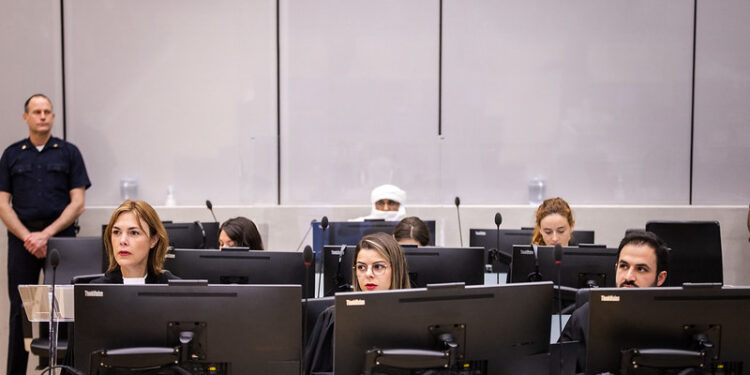The case of Malian Al Hassan Ag Abdoul Aziz Ag Mohamed Ag Mahmoud appears to be drawing to a close, with the defence expected to conclude its presentation of in-court evidence in the course of November 2022.
In readiness for the final stages of the case, Trial Chamber X’s Judge Antoine Kesia-Mbe Mindua, (presiding), Judge Tomoko Akane, and Judge Kimberly Prost have given the parties and participants detailed instructions on the modalities of the presentation of the final briefs and closing statements.
Noting that the defence has completed almost half of its oral witness testimony, the chamber has issued directions on the conduct of proceedings and set deadlines in regard to the end of the defence case, the potential evidence in rebuttal/rejoinder, as well as the closure of evidence and closing statements “to facilitate the effective preparation of all parties and participants”.
The court had earlier expressed concern about the original schedule, reminding the parties of its previous directions that they should efficiently present their evidence to wisely use the time allocated.
The judges had urged the defence to avoid gaps in the hearings and ensure that any lapses and last-minute cancellations are kept to the minimum
“Having had regard to the amended tentative schedule filed by the defence, the chamber currently expects that the defence’s presentation of in-court evidence will conclude during the course of November 2022,” said the chamber in a decision dated August 29, 2022.
Al Hassan is facing 13 counts of war crimes and crimes against humanity, which he is alleged to have committed in his role as the leader of the Islamist police. These include five counts of sexual and gender-based crimes and one count of destruction of eight historical and religious buildings and the door of a historically significant mosque in Timbuktu, Mali.
The chamber recalled that the hearings were scheduled until Friday, October 22, 2022, but that it will hear the remainder of the defence case between October 25 and 31, 2022 and November 1 and 11, 2022, and as necessary from November 14 until 18, 2022.
The chamber noted that the defence has yet to file an application on the number of witnesses whose evidence is to be introduced and directed the lawyers to file as many of these applications as possible by September 26, 2022. It set a deadline for this on October 24, 2022.
The lawyers were also asked to file any request for submission of evidence other than through the remaining witnesses by October 24, 2022, and if necessary, within one week after the completion of the testimony of the last defence witness.
The court also instructed the prosecution to submit a preliminary request on any potential rebuttal evidence by October 12, 2022 “to facilitate fair and expeditious planning of the closure of the evidence submission phase” of the trial.
Both the prosecution and the legal representatives of victims (LRVs) were given four weeks to submit their closing briefs after the closure of the submission of evidence.
“The defence’s final brief is due four weeks after notification of the prosecution’s and LRVs’ final briefs,” said the chamber.
The responses to the briefs will be due two weeks after notification of the defence’s final brief and the closing statements of both parties and participants will take place within two weeks of the notification of the responses to the briefs.
The court directed that the prosecution and defence final briefs be drafted in English and not exceed 200 pages, while the respective responses should not exceed 50 pages.
The participants’ briefs, should they be in French, should not exceed 120 pages and their responses should not be more than 25 pages, the judges said.
The prosecution has responded by requesting the court to clarify its instruction on the language it can use – English. It argued that the Rome Statute does not limit the Office of the Prosecutor (OTP) to use any of the working languages of the court, as the chamber has done in the present case
It based its argument on the fact that Mali is a francophone country, “a part of the documentary evidence is in French”, and 29 witnesses have so far testified in French before the chamber.
The prosecution further stated that many Mali prosecution team members are francophone and that various other constraints weigh on the OTP, including resource shortages of its Language Service Unit.
Al Hassan is alleged to have committed the crimes he is accused of in Timbuktu between April 2012 and January 2013, when the Malian city was occupied and ruled by radical Islamist groups. Between April 2012 and January 2013, he was the leader of the Islamic police set up by Ansar Eddine and Al Qaeda in the Islamic Maghreb. The city fell to a coalition of Tuareg rebels and Islamist militant factions in mid-2012. They enforced a harsh form of Sharia law in areas under their control, banning music, forcing women to wear the burqa, preventing girls from attending school, and demolishing historical installations, including Islamic world heritage sites.
He was surrendered to the ICC by the Malian authorities on March 31, 2018 and his trial opened on July 14-15, 2020. The prosecution presented 52 witnesses. On February 8, 2022, the legal representatives of the victims made their opening statement and later called two witnesses.
During her opening statement on May 9, 2022, Melinda Taylor, Al Hassan’s lead counsel, told the court that her client was a victim of circumstances because he happened to have been in the wrong place at the wrong time, and had the wrong ethnicity.







